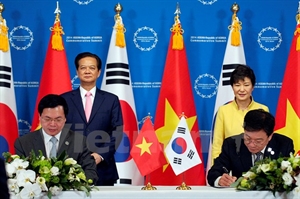
| Vietnam, RoK conclude free trade agreement talks | |
Vietnam and the Republic of Korea signed a minutes on the conclusion of negotiations of their bilateral free trade agreement (FTA) in Busan on December 10. The signatories were Vietnam’s Minister of Industry and Trade Vu Huy Hoang and RoK’s Minister of Trade, Industry, and Energy Yoon Sang-jick. Prime Minister Nguyen Tan Dung and President Park Geun-hye witnessed the signing ceremony. The two countries started the FTA talks in August 2012 and after eight official negotiation rounds and 8 mid-term and chief negotiator meetings, the two sides have basically agreed on the contents of the agreement on a comprehensive scope with high commitments and ensuring balanced mutual interests. The main contents of the agreement cover the trading of goods and services, investment, intellectual property, measures on food hygiene and safety, rules of origin, customs facilitation, trade defence, technical barriers in trade, e-commerce, institutions and law, and economic cooperation. The RoK will offer tariff cut and new export opportunities for Vietnam’s key agro-fishery products including shrimp and fish and tropical fruits, as well as industrial products such as garment-textile, and mechanical products. Additionally, the RoK agreed to give more opportunities for Vietnam ’s services and investment, while enhancing economic cooperation and providing technical assistance in various fields for Vietnam . The country will for the first time allow Vietnamese garlic, ginger, honey, and shrimp to enter its market, giving an advantage to Vietnam over other competitors in the region. Meanwhile, Vietnam will offer preferential treatment for RoK’s industrial products such as materials and accessories for textile-garment, plastic materials, electronic parts, trucks and cars of 2,500cc and over, automobile parts, electrical home appliances, iron and steel products and electric cable. The RoK will liberalise tariff for 95.43 percent of its tax lines, while the figure for Vietnam is 89.75 percent. Apart from important export benefits, the Vietnam-RoK Free Trade Agreement is expected to help improve the import efficiency for the production of export staples such as garment-textile, footwear, and electronics, while increasing the rate of high-added value products. Vietnam ’s commitments to a transparent and open investment climate and fair competition in line with international rules are hoped to help increase investment from the RoK, especially in high technology and processing industry. The two sides are scheduled to complete negotiations on remaining technical issues and finalise necessary procedures to officially sign the agreement in early 2015 | |
| VN+ |
